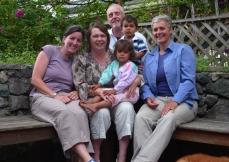“How do you feel about homosexuals, knowing that they’re going to hell for their sins?”
Posed as a theoretical discussion starter, the question stopped prospective parents Amy Bohigian and Jane Byers in their tracks.
“It kind of came out of the blue in the middle of the day,” Byers recalls. “Obviously, it wasn’t a theoretical discussion.”
Bohigian and Byers were in the middle of a two-week homestay with Christian fundamentalist couple Ian and Louise, foster parents of Franny and Theo, the 10-month-old biracial twins the lesbian couple hoped to adopt.
Byers pulled her partner aside.
“
I can’t get into a discussion like that,” she told Bohigian. “We’re here to bond with the kids and make that transition go smoothly, and I’m not interested in talking about things like that.”
Byers said as much to Louise, who had asked the jarring question. “She knew better than to try and bring stuff like that up again,” Bohigian noted.
But the incident rattled the two couples for the rest of the day, introducing an elephant in the room that until then hadn’t reared its head, as the four adults focused on the twins’ well-being and their imminent departure to their new Nelson, BC, home with Bohigian and Byers.
The evolution of the two couples’ relationship is the fulcrum of Conceiving Family, Bohigian’s hour-long film that charts the joyful, humorous but sometimes rollercoaster journey gay couples face when they decide to adopt.
Not long after the lesbian couple decide to take the adoption plunge, we’re scooped along on their car ride to Kelowna to meet the Christians and the twins for the first time. Like Ian and Louise, Byers and Bohigian have their own hard-wired concerns.
“You couldn’t pick a group that hates gays and lesbians more than Christian fundamentalists,” Byers observes. “They’re afraid of us.”
“I’m afraid of them,” Bohigian admits. “For sure, we don’t get a chance, necessarily, to be in conversation with the Christian fundamentalists very much as a gay community, never mind as people living our daily lives.”
Yet even amidst the tension underlying the homestay, both couples laugh at the “reality TV” scenario they find themselves in.
“They said, ‘We think of it as God’s joke,’ and we just said it was totally ironic, whatever meaning we both made of it,” Bohigian says.
With the twins now approaching their fourth birthdays, she says the relationship feels like family.
“It’s like having an extra set of grandparents, but you don’t have all the family history with them necessarily,” Bohigian observes. “We actually enjoy each other’s company.
“When they come to visit Nelson, we joke about Nelson as the hotbed of hippies and gays; when we go to Kelowna, we say we’re in the Bible Belt. It’s become a conversation we can continue.”
That said, Ian and Louise’s change of heart is not complete. If they had to choose, they still feel a straight couple is “more equipped to parent than an average gay couple,” Bohigian says.
Nonetheless, “I think we’ve rocked their world a little bit,” she adds.
That Franny and Theo bonded easily with her and Bohigian “kind of melted away all the other differences,” Byers says.
She says the experience forced her and Bohigian to revise their own perspective somewhat. “It’s not always the best idea to put everybody in a box.”
“When the motivation is there, there’s all kinds of possibilities to try and get along and seek common ground,” Bohigian adds.
Too often, it’s the differences that are highlighted, she says, pointing to the controversy over the Burnaby school district’s recently passed anti-homophobia policy. “Every one of those parents probably wants what’s best for their kids; it’s just that they differ on what that means.”
“I would love for Christian groups to be open to watching this,” Byers says of Conceiving Family.
“In our progression of becoming better friends with Ian and Louise, they saw us as the exception to their rule that gays and lesbians couldn’t be good parents,” Byers observes. For the lesbian couple, Ian and Louise also proved to be the exception “in terms of fundamentalist Christians.”
“They are open to examining their belief systems and open to questioning certain things, and I don’t see that generally in that community,” Byers says.
“Maybe I’m wrong about that. I hope I’m wrong.”


 Why you can trust Xtra
Why you can trust Xtra


